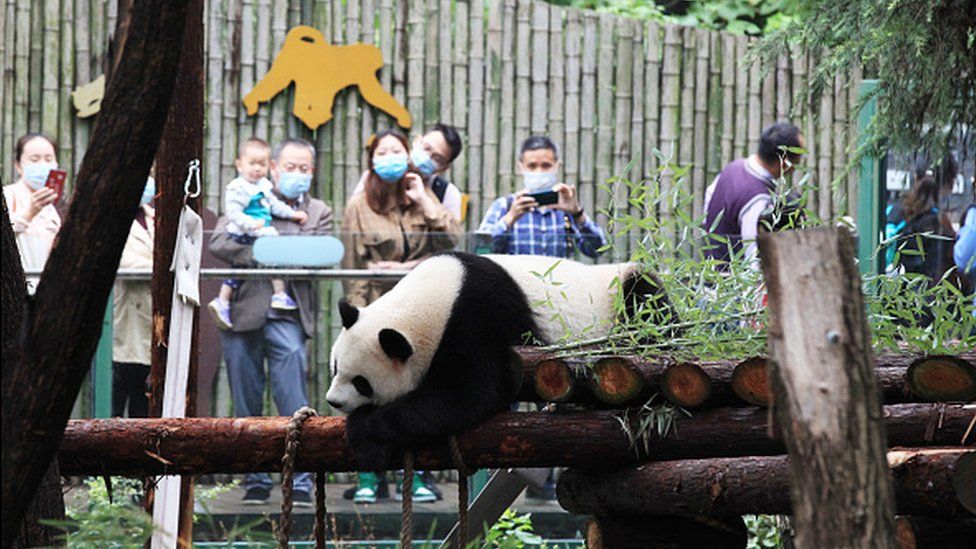A zoo in central China has raised eyebrows this week after it was caught seemingly trying to pass off a dog as a wolf.
Social media footage appeared on Tuesday showing a visitor to the Xiangwushan Zoo in Xianning, Hubei province, visiting the zoo’s wolf enclosure.
He filmed an animal that looked like a Rottweiler lying on its side in a cage, and said to the animal: “Woof! Are you a wolf?” in a short video that has since gone viral.

It has led to a lot of jokes online, but has also sparked debate about whether zoos are necessary in a post-Covid era, with many voicing concern about their maintenance.
Wolf had ‘died of old age’
Mr Xu, who filmed the footage, told Beijing News that he had asked staff at the park why there was a dog in the wolf’s cage. He said he was told that there had been a wolf, but that it had “died of old age”.
An employee confirmed this to local media, and said that the dog, which had been raised as a watchdog by the park, was only being kept there temporarily.
But as the Shine.cn news website notes, he did also hint that the zoo had been financially struggling, saying it “didn’t have enough visitors to keep the zoo up and running well”.
The park, which charges 15 yuan ($2.30; £1.70) and also keeps lions and tigers, has now been told by the local forestry bureau to remove the sign leading to the enclosure.
‘At least get a husky’
The incident has sparked a lot of discussion online. Many users on the popular Sina Weibo microblog say that it has given them a good laugh, although others say that they are “shocked” and that it actually makes them “a little sad”.
“At least get a husky,” one Weibo user says, noting that the breed would at least look more similar to a wolf. Their post received more than 6,000 likes.
Many users said they were relieved just to learn that the dog was not the wolf’s dinner.
Some are talking about their own experiences as kids of visiting “poorly run” zoos, saying that reality never quite meets up to expectation.
There have been a number of well-publicised instances of zoos providing poor substitutes for wild animals.
In 2019, similar video footage showed a domestic dog in a wolf enclosure at the Jiufengshan Forest Park in the nearby city of Wuhan.
‘Struggling to survive’
Although it has bemused many, this incident has also led others to voice concerns about the continued operation of such zoos.
While they are beneficial to local tourism, the Global Times newspaper notes that many zoos, especially smaller ones, “are struggling to survive nowadays”, especially in the wake of the pandemic. There are users voicing fears that this could lead to animals being neglected.

In January, a popular zoo in the eastern city of Nanjing asked the public for donations, revealing that it had not been able to pay its employees’ salaries as a direct result of the Covid-19 pandemic.
Xianning’s local economy suffered significantly last year, as Hubei province felt the brunt of China’s Covid-19 outbreak. The city is not far from Wuhan, the original Covid-19 epicentre, and was one of many cities in Hubei that went into strict lockdown between January and March 2020.
Calls to be ‘gradually phased out’
Animal rights activists have been repeatedly critical of China’s zoos over the years. The South China Morning Post noted in 2017 that stories have perpetuated about poor conditions and the maltreatment of animals at Chinese zoos.
Animal protection laws are somewhat limited in China, but they have gradually been stepped up over the last year, as Covid-19 has led to crackdowns on activities where the hunting, trading or eating of wild animals could lead to disease.
But many in China have also been increasingly discussing how their own experiences of confinement during 2020 have led to them questioning whether zoos need to be “gradually phased out” and replaced by conservation or safari zones.
This was especially apparent last April, when footage circulated online showing a “depressed” tiger walking in circles around a cage at a zoo in Beijing.
Users took to Weibo to talk about how they now felt they had “been there” themselves, and some urged the return of wild animals to the “mountains and grasslands”.